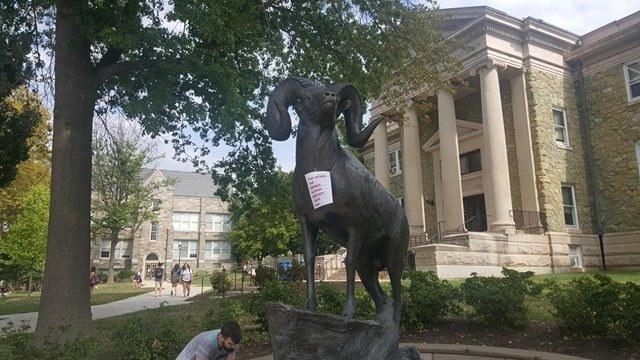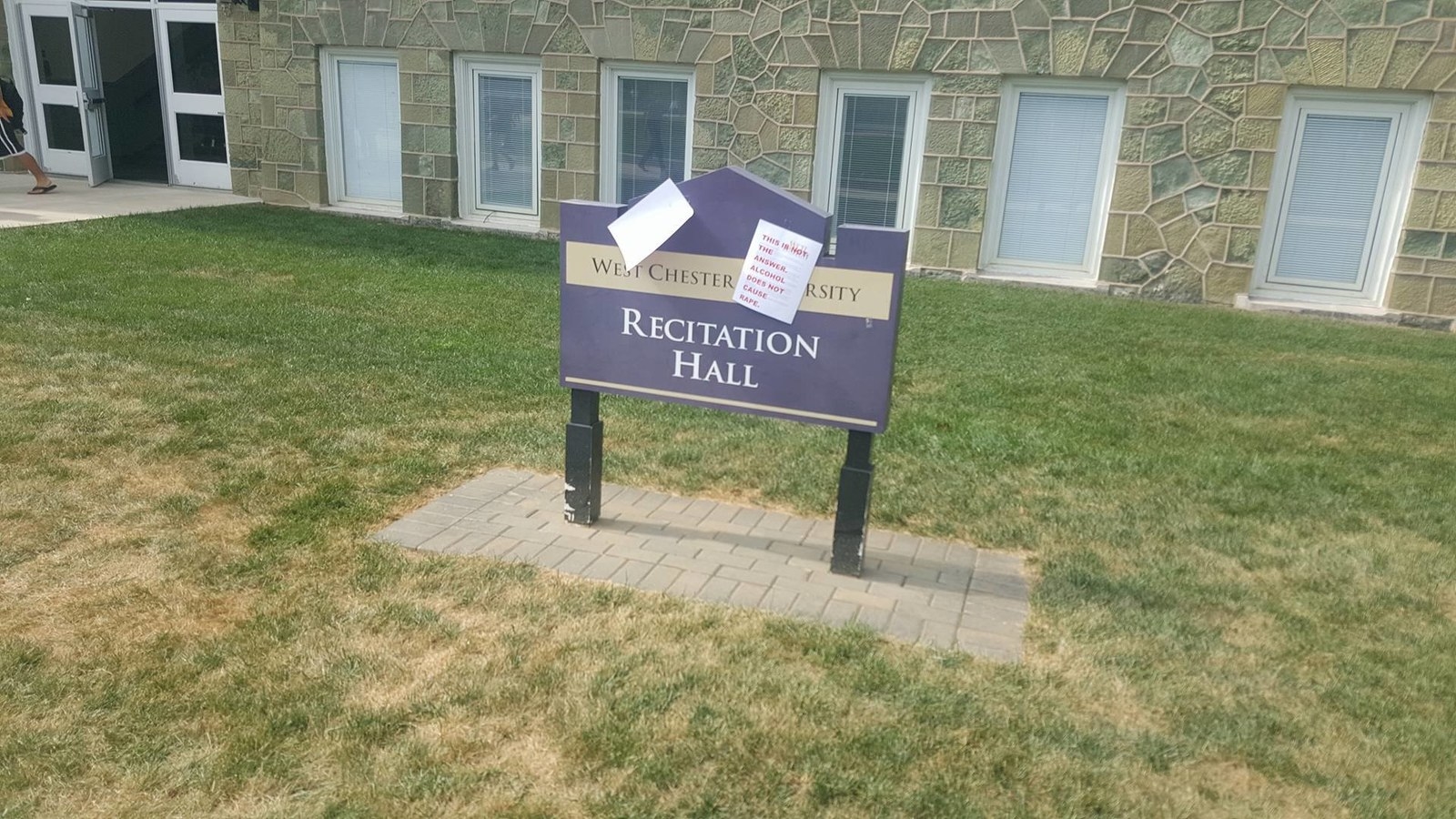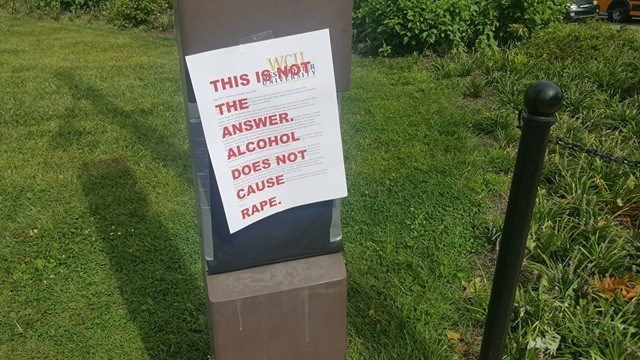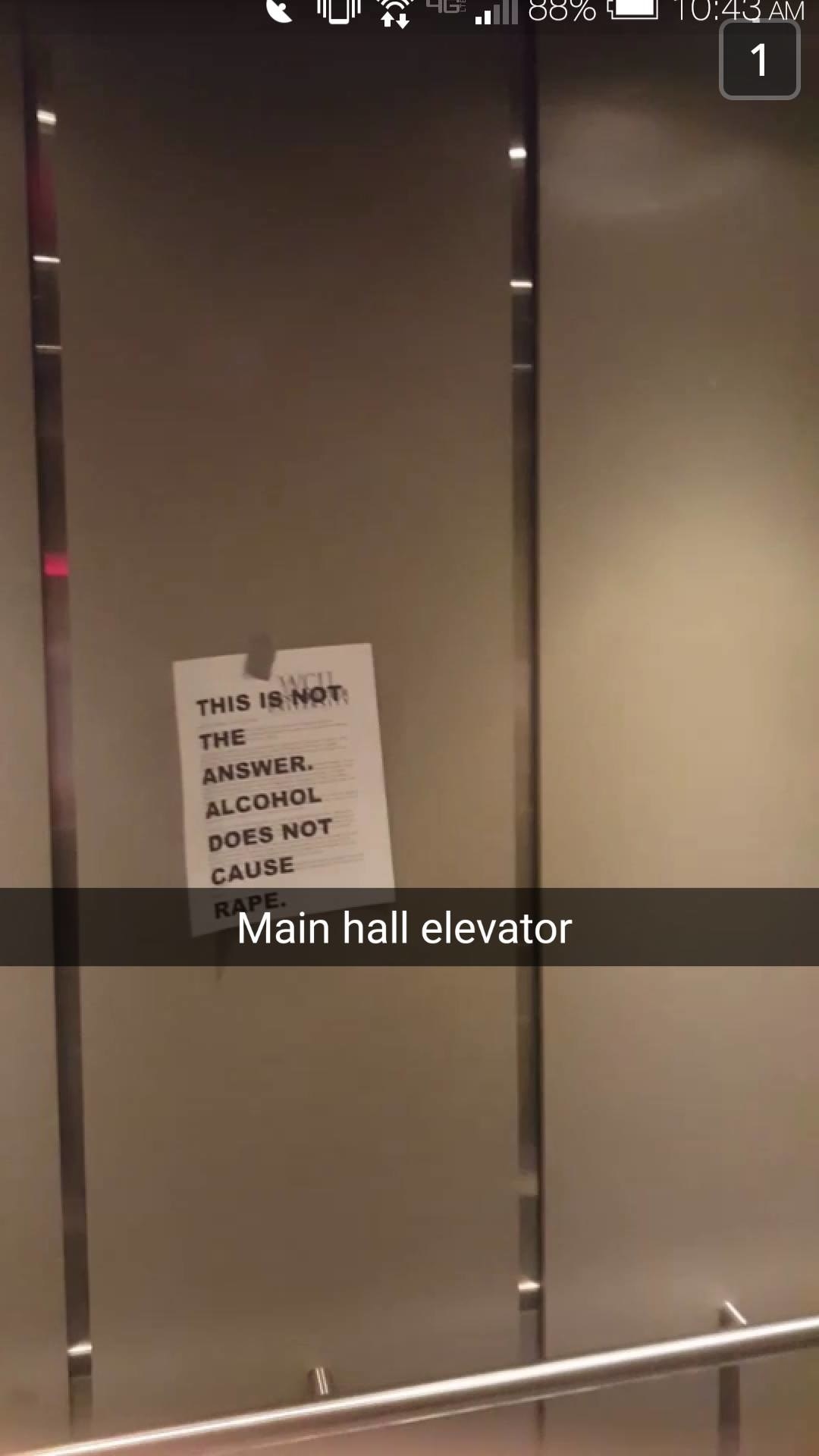
This past weekend, West Chester University experienced campus sexual assaults - both in residence halls, both by people familiar to the victim. Students received a safely advisory after the fact informing them of the assaults.
In the wake of the Stanford rape case, how universities are handling campus sexual assault is an important and popular topic. This is probably one of the reasons that West Chester University President Christopher Fiorentino very promptly sent out an email condemning campus sexual violence and outlining available resources, as well as rolling out some new programs.
The email reads as follows:
Dear WCU Students, Faculty and Staff, Sexual misconduct and assault have become all too common on campuses across the country. This past weekend we experienced incidents that underscore the need for continuing vigilance as we also confront this serious problem. As we begin the academic year, it is important to emphasize the University's position on this matter: sexual violence and misconduct is a serious offense that will result in criminal prosecution. Indeed, former student perpetrators who have been tried and convicted of such crimes have been sentenced to prison. At the same time, WCU supports all victims of sexual assault and misconduct through a variety of support services. From the Office of Social Equity and Center for Women & Gender Equity to the Office of Wellness Promotion and campus sexual misconduct advocate, we remain committed to addressing victims' needs and engaging the community in efforts to combat violence. The Green Dot Bystander Intervention program, the Healthy Masculinity Series, and the "Think About It" online modules are just a few of those initiatives. In addition to these efforts, we need all members of the campus community to help us establish a culture-of-care every weekend. We need you to send a very clear message that violence will not be tolerated at WCU and everyone is expected to do their part. To that end, we will be launching some new efforts to help keep students safe. Starting this weekend, Public Safety will institute safety checkpoints. Officers will speak with groups of students leaving and returning to campus about responsible actions, substance abuse and by-stander responsibilities. Random sobriety checks will also occur throughout the weekend. In addition, the Center for Women & Gender Equity and Wellness Promotion staff will create special announcements to promote safety in the residence halls. And all students will be encouraged to attend the upcoming residence hall floor meetings led by Residence Life and Public Safety staff to discuss responsible actions and ways to stay safe. I urge you to increase awareness, share information and hold each other accountable. Know that we will do whatever is needed to ensure a safe educational environment for all members of our community. Sincerely, Dr. Christopher FiorentinoInterim President, West Chester University P.S. Information about reporting sexual misconduct and support resources is available at www.wcupa.edu/sexualmisconduct.
The Bad Within The Good
At first glance, this is a good email. The President condemns campus sexual violence, and encourages all staff, faculty, and students to do so as well. He provides information on campus resources and programs that aim to start conversation about and decrease campus sexual assault. He even talks about upcoming efforts to bring sexual assault education into the residence halls themselves.
But, there is one more paragraph in that email. There is one paragraph in that email that, while most likely seeming non problematic to some, has caught the eye of many students.
There is one paragraph that rings of - reeks of - some of the same philosophies that we have been hearing throughout that same aforementioned Stanford rape case.
That paragraph reads:
"To that end, we will be launching some new efforts to help keep students safe. Starting this weekend, Public Safety will institute safety checkpoints. Officers will speak with groups of students leaving and returning to campus about responsible actions, substance abuse and by-stander responsibilities. Random sobriety checks will also occur throughout the weekend."
What many students see in this paragraph is the suggestion that to confront the issue of campus assault is to confront the issue of alcohol (and drug) consumption. It is to talk about "responsibility" and "substance abuse". The idea of sobriety checks - to stop campus assault? - implies that, by scaring students into not drinking, this will somehow stop sexual assaults.
Who else remembers Brock Turner blaming his assault on "party culture"? And the whole issue being wrapped in the "well, she was drunk, so drinking caused it" and "drunk kids make mistakes" mentality?
Students at West Chester University do. And they are not going to stand for it happening here, on their campus.
We Are Angry
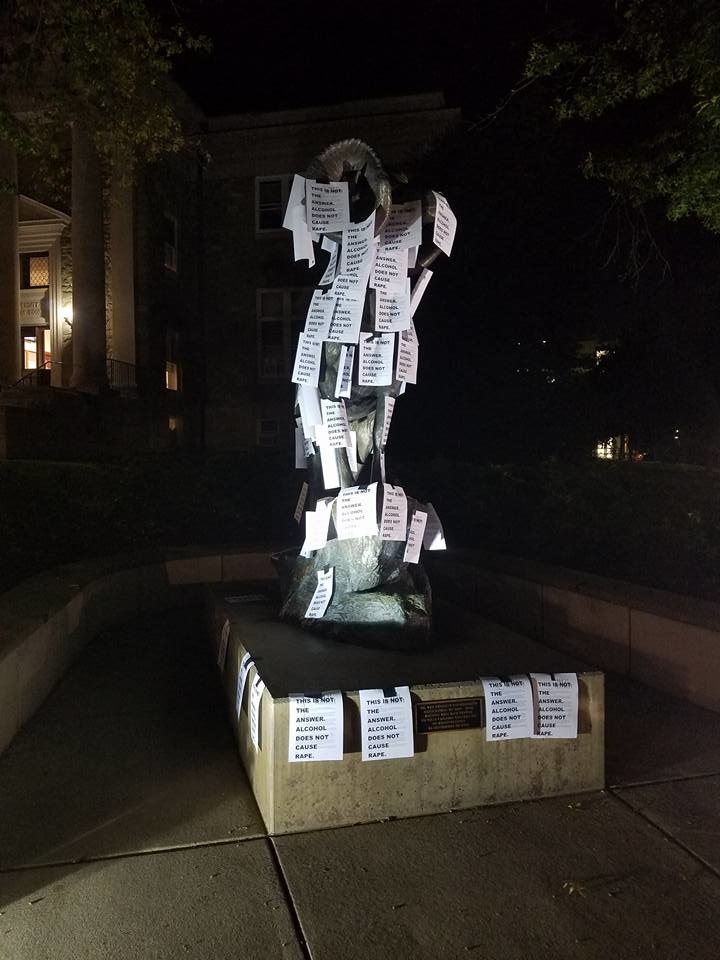
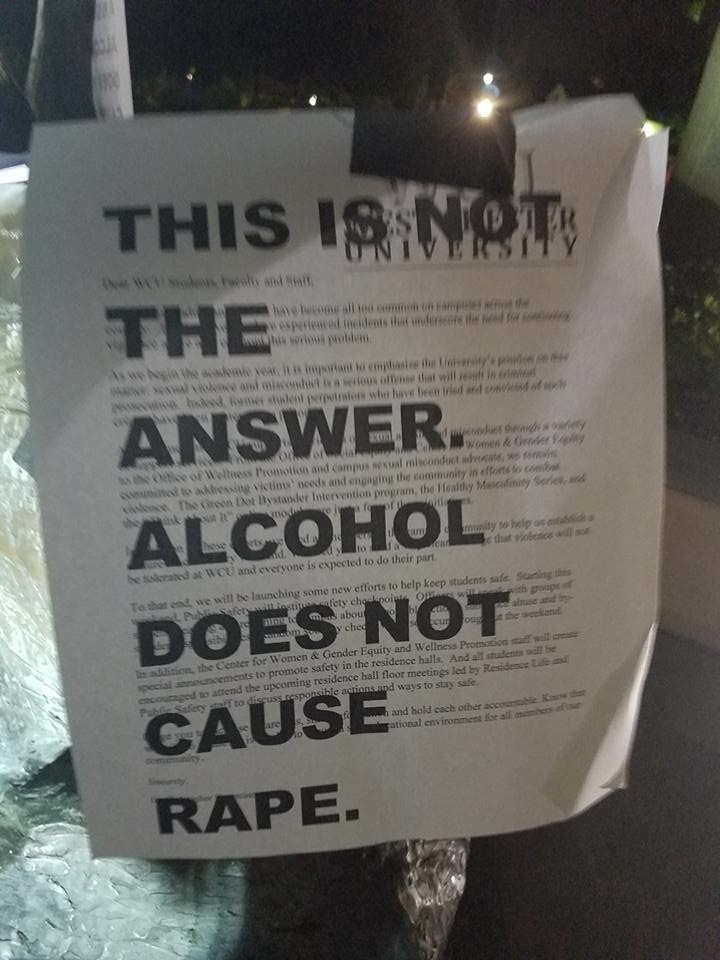
On the evening of September 7th, a statue of WCU's mascot, the Ram, was boldly covered in protest.
The papers covering the statue are printouts of the above email from WCU's President with a bold, unapologetic message from the student body: "THIS IS NOT THE ANSWER. ALCOHOL DOES NOT CAUSE RAPE."
Looking at these images - and one can imagine, standing in front of the statue live - the anger and the resentment radiates.
The students at WCU know that they deserve better.
The girl who captured the above photos posted them to Facebook with this powerful statement:
West Chester University recently sent out an email due to us having sexual assaults occur within the first week of campus. While the email was well intended, it skirted around the real issue of rape. Instead it tried pointing to alcohol and substance abuse as the cause. I commend who ever did this as a response. Thank you for shining light on an ongoing issue in our society and on college campuses. The real cause of rape is caused by people. Rape is rape. And it doesn't matter how many sobriety checks you have on campus or lectures on alcohol consumption, until we as a society recognize rape culture for what it is nothing will change. I'm sick of rape culture. I'm sick of being on guard when I have to leave the library at night. I'm sick of being nervous when a stranger approaches me when I'm alone. I'm sick of hearing of white boys getting off easy because it'll "effect his future" when the individuals they assaulted will live with the trauma forever. I'm sick of victims, men, women and those of all sexualities and genders constantly being blamed when they are assaulted. I'm sick of it.
Please Listen, WCU
West Chester University, please listen to your students. They appreciate your condemnations, your programs, your campus resources. Your efforts are not going unnoticed.
But this is what they need. They need YOU to confront the issue head on, for what it is. They need you to stop masking campus sexual assault as something that happens when people get too drunk or act irresponsibly. They need you to listen to what they have to say, to what college students are saying all over the country.
I, myself, took it into my own hands to address the issues with this email. While I am not a WCU student, my boyfriend is, and after showing me the email from the President I felt as though I had to take action. I sent an email to President Fiorentino, and after posting the email to Facebook, got an overwhelming amount of support from the student body.
The email reads:
Dear Dr. Fiorentino,My name is Judy Liberatoscioli, and I am a sophomore undergraduate student at Drexel University. Clearly, I do not attend West Chester University, but my boyfriend does and he shared with me an email send out regarding measures taken to decrease the amount of sexual assault and violence on campus.I would like to start by commending many of the measures proposed and the programs that exist on campus to combat this epidemic. While there is no sure fire way to stop all acts of sexual violence, even the simple reminder that offenders will be prosecuted and sent to prison is comforting to many women (and men) on your campus, especially in the wake of the Stanford case.The reason I email you tonight is because I am concerned about one aspect of the proposed changes that was included in that email. The email stated, "Random sobriety checks will also occur throughout the weekend." I believe that I see many of the reasons that this could help decrease sexual violence on campus - it is not an uncommon idea that many rapes occur while one or both of the people involved are intoxicated in some way, and that posting sobriety checks around campus will deter students from partaking in alcohol or drug related conduct.I do, however, feel as though I have to point out a flaw in this reasoning. Assuming that an intoxicated student stopped at one of these checkpoints is not as a result safely escorted home and made sure to be safe with no further consequences (and if this is the case, I apologize and might have misinterpreted the email), this addition of checkpoints might become a barrier to students trying to escape uncomfortable situations.As an example: A female student is at a party with some friends. Some male, some female - or perhaps she is drinking alone with a male friend of hers. Regardless of the composition of the party, once this girl is intoxicated and is aware of the fact that attempting to leave the safety of whatever dorm or house she is partying in might result in a random checkpoint and resulting consequences, she is less likely to leave this environment. This presents several problems.1. An intoxicated student who fears a checkpoint might stay in an environment that pressures her to drink, not only reversing the intended effect of the checkpoint (to deter heavy drinking), but also increases the likelihood of alcohol poisoning.2. A possible sexual predator could use the threat of a sobriety checkpoint as leverage to keep a targeted student to stay.3. If a student feels as though they are too drunk to be comfortable at a party, but do not want to risk going back on campus in fear of checkpoints, they could end up unconscious or severely incapacitated in a threatening environment.4. Even if not passing unconscious from alcohol, the sheer fact that any amount of noticeable alcohol in a student's system will result in consequences will increase the amount of people deciding to sleep in rooms or buildings other than their own, again making them vulnerable to sexual assault.These are only a few of the countless scenarios in which the idea of sobriety checkpoints ends up increasing a student's susceptibility to sexual assault, rather than decreasing it. Of course, if students would just "not party", some of these scenarios might not exist. But unfortunately, anyone who has contact with a college campus knows that students who want to party will party, regardless of rules set in place. This concept of checkpoints only serves to make students who are in a vulnerable position less comfortable looking for help as they feel that the school is looking to punish, rather than protect, them. It should also be stated that alcohol itself is not the cause of sexual assault, even though it does put students in a more vulnerable position. But, rather than punish the person at risk, it would likely be more beneficial to relocate that effort towards protecting students in vulnerable positions and confronting the causes of campus sexual assault straight on.I understand that it is important to you and to all people at WCU (students, staff, and faculty) to create a safe environment for students. I also understand that sometimes, the best way to keep people safe is to keep the lines of communication open. Putting up barriers between the school and the people who are most vulnerable to sexual assault cannot serve to protect those students. A mother who does not punish her child for drinking will have a child who knows that it is a better idea to call her than to get in a car with a drunk driver. A mother who does punish her child for the same thing is more likely to receive a call from the emergency room, as many underage drinkers would rather risk harm and injury than confront certain persecution. The same rule applies on college campuses. Having a program that anonymously escorts inebriated students to their dorms will result in a decrease in sexual assaults, while a programs that punishes them will drive them into a perpetrators arms.I hope that I was not out of line with this email, especially considering the fact that I do not attend this institution, but I have been very closely impacted by the results of campus sexual assaults and felt as though it was my responsibility as a fellow woman, and as a fellow student, to point out the danger that I see in this program.Thank you so much for your time, and thank you for your continued efforts in fighting campus sexual violence.Best Regards,Judy Liberatoscioli
While I do not feel comfortable being the voice for WCU, I felt it was my obligation as a fellow student - and as a fellow person - to say something.
I am waiting for a response from President Fiorentino, and I encourage all of you at West Chester University (and at colleges everywhere) to take this issue even more firmly into your own hands. Have a conversation with a classmate, email the President, do something to make a statement.
Compromise, be kind, but don't let the anger die.
Will update with any further information.
UPDATE: Flyers Continue To Spread Across Campus
These are only some of the flyers that were spotted around campus on Thursday, September 8th.
